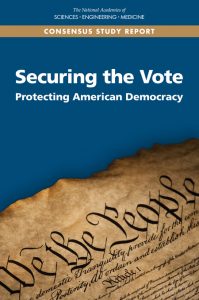
At this year’s SENCER Summer Institute many participants cited the many emerging civic challenges related to voting and elections as a pressing and timely focus for SENCER courses and programs. On September 6th the National Academies of Sciences Engineering and Medicine (NASEM) publicly released a new consensus study, Securing the Vote: Protecting American Democracy that provides a helpful new resource. Commissioned in 2016, the NASEM committee began its inquiry by focusing on common assumptions about barriers to voting, such as long lines at polling places, and the prevention of technical problems that affect election outcomes, including “hanging chads.” However, technological and social efforts by foreign actors to undermine confidence in the 2016 election gave the committee’s work new urgency and surfaced broader challenges for protecting election infrastructure and maintaining public faith in the accuracy of election results.
At the public release, the co-chairs of the committee, presidents Lee C. Bollinger of Columbia University, and Michael A. McRobbie of Indiana University, addressed the different aspects of the report and its recommendations. President Bollinger opened the meeting with remarks about the genesis of the study and the change in focus brought about by foreign interference in the 2016 election. President McRobbie’s presentation provided a summary of the recommendations made in the report. In addition to the co-chairs, other representatives from the committee were on hand to address some of the technical questions posed by the audience.
The most prominent recommendations made by the committee were that election contests be conducted with “human readable paper ballots,” that election technology which does not produce a paper trail should be removed from service, and that paper ballots be used in as many contests as possible in the 2018 elections, and in all elections by 2020. (recommendations 4.11 and 4.12). The committee also decisively recommended against transmitting ballots over the internet for the foreseeable future, or until the security and accuracy of such a system can be guaranteed (recommendation 5.11). Noteworthy for the NCSCE community was the recommendation that universities and community colleges should design curricula to address the evolving organizational management and information technology aspects of securing the vote (recommendation 6.3).
As with all National Academies publications, the report is available for free online, and can be viewed and downloaded in its entirety here. For ideas about including elections and issues related to voting in STEM courses and curriculum, you can download the Engaging Mathematics teaching manual Great Ideas of Modern Mathematics: Voting Theory.
